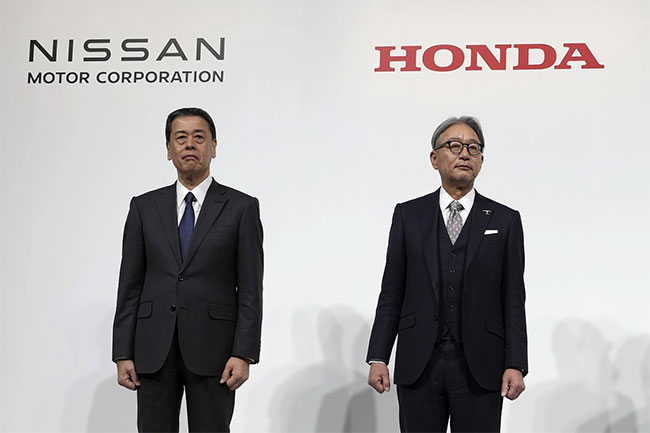Japan’s Nissan and Honda have ended talks on a deal that would have created the world’s third-largest carmaker.
The two companies, along with their junior partner Mitsubishi Motors, have agreed to “finalize” a memorandum of understanding to join forces, Nissan said in a statement on Thursday.
“Going forward, Nissan and Honda will collaborate within the framework of a strategic partnership aimed at the era of intelligent and electric vehicles, seeking to create new value and maximize the corporate value of both companies,” it said.
Nissan and Honda announced in December that they would begin talks on a merger within the next six months, which would give them more leverage to compete with growing competition from Chinese automakers such as BYD.
The deal was prompted by the need to combine their resources to stay competitive as the industry shifts to electric vehicles. However, after weeks of negotiations, the talks appeared to have stalled.
During the talks, the statement said, various options were considered regarding the structure of the business combination.
As initially agreed, Honda proposed changing the intended merger structure from a joint company with Honda as the parent company and its subsidiary as its subsidiary through a share swap. Ultimately, both companies concluded that “stopping the talks” was best, the statement added.
Nissan has struggled since the collapse of its long-standing alliance with French automaker Renault. It is facing severe financial problems, which has left it in dire need of a larger partner. Some analysts had speculated that Nissan could face bankruptcy in 2026 because of its heavy debt load.
Nissan’s profit in the six months ended September fell 94% compared to the same period in 2023, as the company lost money on its automotive operations and reported only a narrow profit due to its financial business. In response, Nissan announced that it would reduce its production by 20%, resulting in the layoff of 9,000 employees. It also cut its full-year operating profit forecast by 70%.
In addition to financial problems, Nissan, like many legacy carmakers, is facing huge research and development costs as it transitions from gasoline-electric vehicle production to electric vehicles, which are needed to comply with stricter environmental regulations around the world.
Despite the financial problems, the company has had some success with its EV offerings, such as the Nissan Leaf, an asset it brought to the table in merger talks.
According to analysts, the cost of EV development has created a strong incentive for automakers to explore mergers as a way to share the financial burden.
“Industry consolidation should be the ‘theme’ for global automakers in 2025,” James Hong, energy transition and automotive analyst at Macquarie Capital, wrote in a research note in December, before confirming that Nissan and Honda were in talks. “We think Honda and Nissan need each other.”
Nissan has been in an alliance with Renault since 1999. In January 2023, the two agreed to restructure their partnership, with the French company reducing its stake in the Japanese carmakers to 15% — a significant milestone in their long-standing partnership.
The carmakers had been working together with junior partner Mitsubishi Motors. The alliance allowed them to share production and technology and ultimately save billions of dollars a year. But the group collapsed in 2018 after the stunning collapse of its former boss, Carlos Ghosn.




